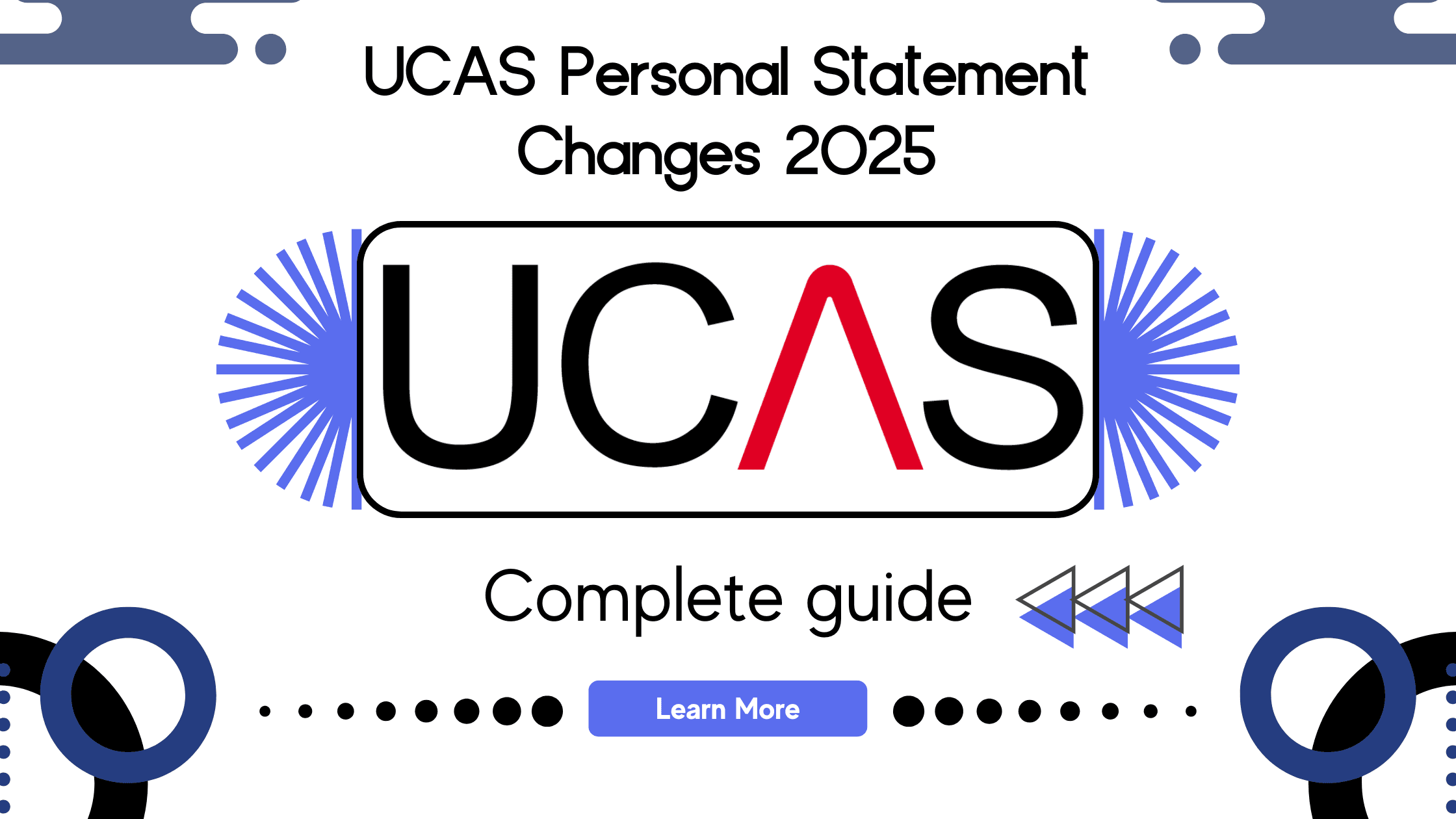
UCAS Personal Statement Changes 2025: Complete Guide

The UCAS personal statement process is evolving for students applying to university in 2026 and beyond. These changes will transform how students present their motivations, qualifications, and extra-curricular activities, aiming to address disparities in the university admissions process.
In this guide, we’ll explore these changes, answer key questions, and offer tips on how to adapt to the new format.
Is the UCAS Personal Statement Being Scrapped for 2025?
No, the UCAS personal statement is not being scrapped. However, it will undergo significant changes starting with students applying for university in 2026. The new format will have three sections that focus on your motivations, qualifications, and extracurricular activities. This change is intended to simplify the application process and create a fairer admissions experience for everyone.
Are UCAS Personal Statements Changing?
Yes, UCAS is changing the personal statement structure for students applying to university in 2026. Instead of the current open-ended approach, the new format will be divided into three sections. Each section will have specific prompts designed to help students explain their reasons for applying, how their academic background has prepared them for their chosen course, and how extra-curricular activities support their application.
What Is the Word Limit for the UCAS Personal Statement 2025?
For the 2025 UCAS personal statement, the character limit will remain at 4,000 characters, including spaces. This means students must still focus on crafting concise and impactful statements to showcase their qualifications and aspirations. Although the format of the application may change, maintaining a consistent character count ensures that students have a clear framework for expressing their motivations and experiences effectively. Being succinct is key to making a strong impression within the allowed space.
Do You Have to Write a Personal Statement for University in 2026?
Yes, students applying for university in 2026 will still need to submit a personal statement, but it will follow a new structured format that will be implemented starting in September 2025. This means applicants will have to adhere to specific prompts and guidelines aimed at standardizing their responses, which will help admissions committees assess candidates more consistently.
In contrast, those applying in 2024 or 2025 can use the current free-form format, allowing them greater flexibility to express their experiences and motivations. This change seeks to ensure that all necessary aspects of an applicant's profile are covered in a more organized manner, making it essential for 2026 applicants to prepare accordingly.
What Are the New Personal Statement Sections for 2025?
UCAS will introduce a more organized structure to the personal statement, divided into three focused sections. Each section comes with its question prompt to guide your response:
- Motivation: Why do you want to study this course?
This section asks students to explain their interest in the subject. Applicants should show how their passion aligns with the course and university, demonstrating their academic interests. - Preparation: How have your qualifications prepared you for this course? This section helps students link their previous academic work, qualifications, and relevant coursework to their chosen subject. It’s a chance to discuss how their education has set them up for success.
- Extra-Curricular Activities: What additional experiences support your application?
Whether it’s work experience, volunteering, or other relevant activities, this section lets applicants showcase how their extra-curricular engagements have prepared them for university life and their chosen field.
Why Are UCAS Personal Statements Changing?
- Goal: The main aim is to reduce inequality in how students are admitted to universities.
- Current Issue: The existing personal statement format allows some students, especially those with private tutors or mentors, to get an advantage.
- New Approach: UCAS plans to change to a structured format for personal statements, making it more uniform for all applicants.
- Fairness: This change is intended to create a fairer opportunity for students from different backgrounds.
- Feedback: The decision is based on a report that gathered opinions from over 1,200 students and 200 teachers, highlighting the need for a fairer admissions system
Can You Explain Extenuating Circumstances in the New Personal Statement?
There's been a change in the university application process. Previously, students could include personal challenges—like family issues or health problems—in their statements. Now, that's no longer allowed in the personal statement itself. Instead, there's a new section where students can explain their challenges or exceptional situations. This change lets applicants share important contexts without affecting the main content of their statements.
How Should Students Prepare for the New Personal Statement Format?
To prepare for the changes, students should start early and familiarize themselves with the new sections. Here are some helpful tips:
- Understand the Prompts Each personal statement prompt serves a specific purpose. Reflecting on these questions can help you articulate your motivations and qualifications for your chosen course. Consider what the prompts ask—whether it's about your interests, experiences, or future goals—and ensure your responses are tailored to highlight how your background aligns with the program you are applying for.
- Draft Ideas Brainstorming is crucial in this phase. Identify experiences that not only showcase your academic preparedness but also reveal your passion for the subject. Think about projects, jobs, or volunteer work that have influenced your interests. Additionally, reflect on extra-curricular activities—like clubs, sports, or community service—that have contributed to your skills, values, and personal growth, making you a compelling candidate.
- Seek Expert Help If the new format feels overwhelming, seeking assistance can provide clarity and direction. Best personal statement writers can offer valuable insights into structuring your statement effectively. They help ensure that your responses address the prompts clearly and are impactful, allowing your unique voice and experiences to shine through in a coherent and persuasive narrative.
Each of these steps is designed to help you craft a personal statement that highlights your individuality and suitability for the course you intend to pursue.
Do You Still Need a Personal Statement for 2026 Entry?
Yes, students applying to university in 2026 will need to submit a personal statement, but it will be in a new structured format starting in September 2025. This means that if you're applying for university in 2024 or 2025, you'll still use the current free-form style for your statement. The new format aims to guide students in organizing their thoughts more clearly, making it easier for universities to assess their applications.
How Can You Make Your Personal Statement Stand Out?
To create a strong personal statement, it's important to be clear, genuine, and relevant. Each part of your statement should directly respond to the prompt while showcasing your enthusiasm and readiness for your field. Focus on highlighting your strengths and experiences that set you apart. If you're finding it difficult to write the perfect statement, consider using the Best assignment service. They can help you refine your content, ensuring that it effectively communicates your unique qualities and aspirations.
Conclusion
The recent updates to UCAS personal statements are designed to help students present their qualifications and motivations more clearly and fairly. The new format encourages applicants to outline their experiences and goals, making it easier for universities to evaluate their applications. By preparing ahead of time and following the new guidelines, you can make your statement stronger. If you need help with your assignments or how to write your personal statement, expert writers are here to assist you. Don’t hesitate to contact us for support!